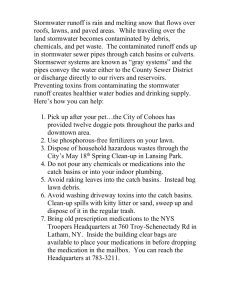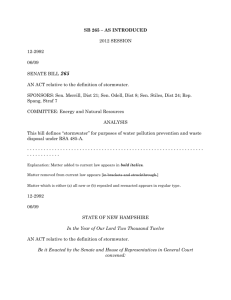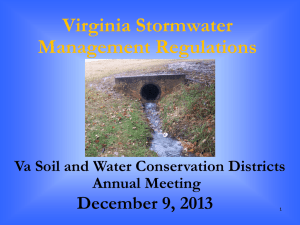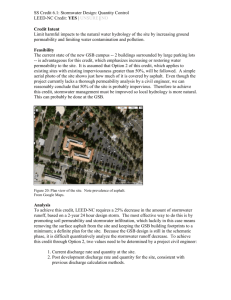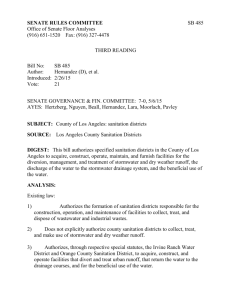assembly floor analysis
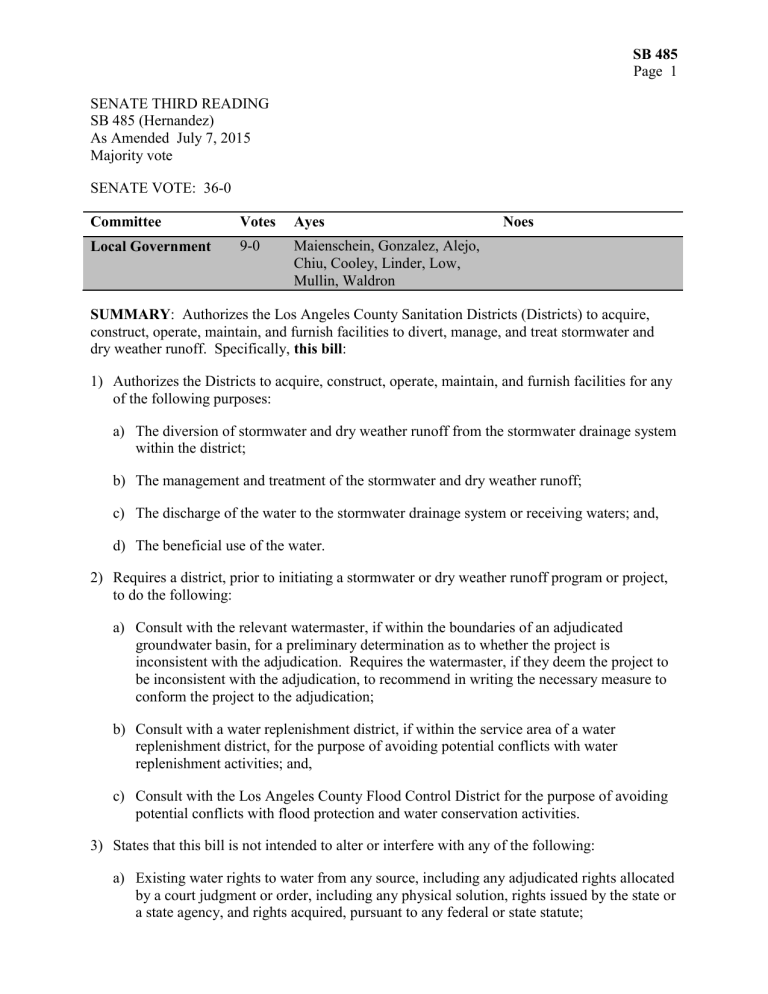
SB 485
Page 1
SENATE THIRD READING
SB 485 (Hernandez)
As Amended July 7, 2015
Majority vote
SENATE VOTE: 36-0
Committee Votes Ayes
Local Government 9-0 Maienschein, Gonzalez, Alejo,
Chiu, Cooley, Linder, Low,
Mullin, Waldron
Noes
SUMMARY : Authorizes the Los Angeles County Sanitation Districts (Districts) to acquire, construct, operate, maintain, and furnish facilities to divert, manage, and treat stormwater and dry weather runoff. Specifically, this bill :
1) Authorizes the Districts to acquire, construct, operate, maintain, and furnish facilities for any of the following purposes: a) The diversion of stormwater and dry weather runoff from the stormwater drainage system within the district; b) The management and treatment of the stormwater and dry weather runoff; c) The discharge of the water to the stormwater drainage system or receiving waters; and, d) The beneficial use of the water.
2) Requires a district, prior to initiating a stormwater or dry weather runoff program or project, to do the following: a) Consult with the relevant watermaster, if within the boundaries of an adjudicated groundwater basin, for a preliminary determination as to whether the project is inconsistent with the adjudication. Requires the watermaster, if they deem the project to be inconsistent with the adjudication, to recommend in writing the necessary measure to conform the project to the adjudication; b) Consult with a water replenishment district, if within the service area of a water replenishment district, for the purpose of avoiding potential conflicts with water replenishment activities; and, c) Consult with the Los Angeles County Flood Control District for the purpose of avoiding potential conflicts with flood protection and water conservation activities.
3) States that this bill is not intended to alter or interfere with any of the following: a) Existing water rights to water from any source, including any adjudicated rights allocated by a court judgment or order, including any physical solution, rights issued by the state or a state agency, and rights acquired, pursuant to any federal or state statute;
SB 485
Page 2 b) Existing water rights law; and, c) Any rights, remedies, or obligations that may exist, pursuant to specified sections in current law.
4) Defines the following terms, pursuant to the Water Code: a) "Stormwater" to mean "temporary surface water runoff and drainage generated by immediately preceding storms"; and, b) "Dry weather runoff" to mean "surface waterflow and waterflow in storm drains, flood control channels, or other means of runoff conveyance produced by nonstormwater resulting from irrigation, residential, commercial, and industrial activities."
5) Authorizes a district to exercise any of the powers otherwise granted to a district under current law in order to carry out the powers and purposes granted by this bill.
6) Specifies that the powers granted by this bill do not affect any obligation of a district to obtain a permit that may be required by law for the activities undertaken, pursuant to this bill.
7) Prohibits this bill from being construed to require any local agency to participate financially or otherwise, in a project pursued under the authority granted by this bill.
8) Finds and declares that a special law is necessary and that a general law cannot be made applicable within the meaning of current law.
9) Makes other findings and declarations.
FISCAL EFFECT : None
COMMENTS :
1) Background .
In 1948, Congress passed the first version of the Federal Water Pollution
Control Act, or the Clean Water Act (Act). The National Pollutant Discharge Elimination
System (NPDES) was amended into the Act in 1972, with a focus on point sources of pollution, such as sewage treatment and wastewater from industrial and manufacturing facilities. After 1972, studies began showing that non-point sources, including stormwater runoff, were a major contributor to surface water pollution. This led to further amendments to the Act that created a framework for regulating stormwater.
In California, the State Water Resource Board provides the policy and regulatory oversight on behalf of the federal government, including the regulation of Municipal Separate Storm
Water Systems (MS4s). The MS4 permitting program regulates storm water discharges from municipalities that operate storm sewer systems. In order to reduce urban dry weather runoff and stormwater discharges, cities, counties, and special districts are required to comply with the MS4 permit requirements and are responsible for the costs associated with compliance.
Local governments face several barriers to funding for stormwater and dry weather runoff projects due to the constitutional requirements for special taxes, benefit assessments, and property-related fees. Many of the local governments that operate MS4 systems differ from water and wastewater utilities that existed prior to the passage of Proposition 218 (1996),
SB 485
Page 3 which have in place service fees. On the other hand, many stormwater programs in cities and counties are funded by the general fund, primarily through property and local sales taxes. As regulatory burdens continue to increase, financially strapped local governments are forced to examine alternative funding mechanisms and regional strategies to address MS4 costs, which some cities in Los Angeles County are citing to be in the millions of dollars.
The Districts are a group of 24 independent special districts that work cooperatively under a
Joint Administration Agreement and share administrative staff. The Districts provide solid waste and wastewater management services. The Districts construct, operate, and maintain regional facilities to collect, treat, recycle, and dispose of sewage and industrial wastes.
2) Author's Statement . According to the author, "This bill would provide local jurisdictions within the Sanitation Districts of Los Angeles County's [Districts] service area a unique tool to help them comply with costly MS4 permits. It has been estimated that compliance with the new MS4 permits will cost billions of dollars and cities are looking for any means to allay those costs. This bill would supplement [the District's] existing authority to manage wastewater and solid waste to include stormwater and dry weather runoff.
"This bill would allow [the Districts] to work with local jurisdictions, in a voluntary, case-bycase basis, for the purposes of designing, constructing, operating, and maintaining facilities for compliance with MS4 requirements. In a time of exceptional drought, this bill seeks to promote collaboration amongst the local agencies to develop a comprehensive approach to water supply and water quality."
3) Bill Summary . This bill grants the Los Angeles County Sanitation Districts the authority to acquire, construct, operate, maintain, and furnish facilities for the beneficial use of water and to divert, manage, treat, and discharge stormwater and dry weather runoff. Under this bill, a district would have to consult with several local agencies, and with the relevant watermaster for a preliminary determination as to whether the project is inconsistent with the adjudication prior to initiating a stormwater or dry weather runoff program or project within the boundaries of an adjudicated groundwater basin. Additionally, this bill requires the watermaster, if they deem the project is inconsistent with the adjudication, to recommend in writing the measures that are necessary in order to conform the project to the adjudication.
This bill also contains provisions to ensure that the authority granted by this bill is not construed to alter any existing water rights. Specifically, this bill states that nothing in the provisions shall be construed to alter or interfere with existing water rights law, rights remedies, or obligations, pursuant to specified sections in existing law and water rights from any source, including adjudicated rights allocated by a court judgment or order, rights issued by the state or a state agency, and rights acquired, pursuant to any federal or state statute.
This bill is sponsored by the Los Angeles County Sanitation Districts.
4) Local Agency Formation Commission (LAFCO) . As special districts, the sanitation districts would need to get the approval of the local LAFCO in order to activate the powers contained in this bill. The Cortese-Knox-Hertzberg Act establishes the process to activate a latent power, including passing a resolution by a district's board, holding a public hearing, and submitting a petition to LAFCO, which includes a plan for services and the estimated cost of the new service.
SB 485
Page 4
5) Prior Legislation . AB 1892 (Harman), Chapter 79, Statutes of 2002, authorized the Orange
County Sanitation District to acquire, construct, operate, maintain and furnish facilities for the diversion, treatment, and reuse of urban runoff.
AB 810 (Campbell), Chapter 209, Statutes of 2001, granted authority to develop and operate urban runoff treatment facilities to the Irvine Ranch Water District and the Santa Margarita
Water District.
6) Arguments in Support . Supporters argue that this bill will provide another option or tool to assist cities in meeting the requirements of the Los Angeles region's municipal stormwater permit. Proponents of this bill argue that the districts can use their civil engineering and water quality expertise to help cities and the counties comply in an efficient and effective manner, which will allow for more water to be collected for reuse.
7) Arguments in Opposition . Unknown.
Analysis Prepared by : Misa Lennox / L. GOV. / (916) 319-3958 FN: 0001340
